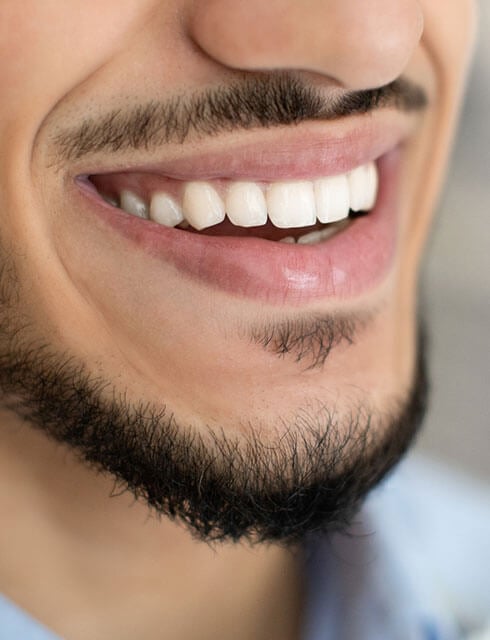Bridges
A dental bridge can replace one or several missing teeth. Using two neighboring teeth to support it, a bridge is placed in the space where the missing tooth (or teeth) is. A bridge can be permanently cemented into place and appears natural.
Crowns
It is important to protect a natural tooth after a root canal or serious decay has damaged it. A crown is placed over the tooth, providing strength and support to it after it has been repaired.
Curodont™
Curodont™ Repair Fluoride Plus, by vVARDIS, is an innovative, painless, drill-free solution for treating early tooth decay and preventing cavities from forming. Thanks to vVARDIS’ proprietary formulation, your early stage tooth decay can now be treated, without pain, injection, and drilling, through guided enamel remineralization. Learn MoreDental Fillings
An extremely durable tooth colored bonding filling material is placed in the cavity after the decay has been removed.
Partial & Full Dentures
Dentures help maintain the function and dimension of the mouth, as well as restore the face to a more natural shape. Without teeth, bone loss occurs and causes the face to be concave. You can replace a few or an entire set of teeth (upper and lower) with dentures.
Preventative Care
Dental checkups performed with teeth cleanings are an essential part of oral and overall health, keeping teeth and soft tissue free of disease and helping to identify potential issues with the mouth.
Learn MorePartial and Full Denture Services in New York to Create a Perfect Smile

Why Partial or Full Dentures?
Life and daily activities can become problematic if you start losing your teeth. From difficulty, while eating, speaking, and smiling, loss of teeth can also result in loss of confidence. Missing teeth negatively impact other teeth and your overall face and mouth structure – including the cheeks and lips. Dentures can help restore your mouth to full functionality and improve your quality of life.
What is the difference between partial and full dentures?
There are two types of dentures – a complete full set and partial dentures. Complete dentures are used when all teeth are missing, while partial dentures are used when some natural teeth remain

What to Expect
Dentures are a removable dental appliance that helps replace missing teeth and surrounding tissue. It is made to closely resemble your natural teeth and may even enhance your smile. There are two types of dentures – complete and partial.
Before Treatment
Why Do People Get Dentures?
There are many reasons that people get dentures.
- Complete Denture - Loss of all teeth in an arch
- Partial Denture - Loss of several teeth in an arch
- Enhancing your smile and overall appearance
- Improve chewing, speech, and digestion
To prepare for your dentures, be sure to talk with your dentist.
During Treatment
The process of getting dentures requires several appointments, usually over several weeks to fully allow the healing process. Highly accurate impressions (molds) and measurements are taken and used to create your custom denture. Several “try-in” appointments may be necessary to ensure proper shape, color, and fit. At the final appointment, your denture dentist will precisely adjust and place the completed denture, ensuring a natural and comfortable fit.After Treatment
It is normal to experience increased saliva flow, soreness, and possible speech and chewing challenges after the procedure. This will subside as your mouth and muscles get used to the new dentures.
You will be given care instructions for your new set of dentures. Proper cleaning of your new dental appliance, good oral hygiene, and regular dental visits will aid in the life of your dentures.
Your First Visit
During your first visit, the dentist will evaluate your teeth to see what type of dentures you will need. There are two types of dentures that you can make: “conventional” or “immediate.” No matter which type you get, you will have impressions made of your mouth and gums. After this, you will have several more appointments to ensure that your dentures fit correctly and are the right shape for your mouth.
Modern Dentistry
All the latest technology can be found at our New York dental office.Judgment-Free Office
We're here to help you feel confident in your smile. We provide a safe, judge-free zone for any dental issue or concern you have.On Your Schedule
Taking care of your dental health should fit within your schedule. We are open late and on weekends so you can get the care you need.Insurance
and Financing









No Insurance? No Problem.
Don't have insurance? That's not a problem with us. We offer payment plans and accept most major credit cards, personal checks, and more.Patient Testimonial
With hundreds of 5-star reviews, need we say more?












Frequently Asked Questions
Loss of some or all teeth; enhancing the overall appearance of a smile; and improving chewing, speech, and digestion.





